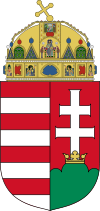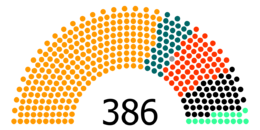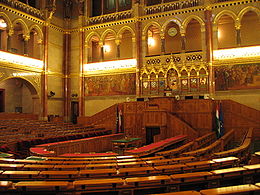- National Assembly of Hungary
-
National Assembly
Országgyűlés
Diet
Type Type Unicameral Leadership Speaker László Kövér, Fidesz
since 6 August 2010Deputy Speakers Sándor Lezsák, Fidesz
István Jakab, Fidesz
János Latorcai, KDNP
István Ujhelyi, MSZP
Zoltán Balczó, JobbikStructure Members 386 
Political groups - Fidesz (227)
- Christian Democratic People's (36)
- Socialist Party (48)
- Jobbik (46)
- Politics Can Be Different (15)
- Independent (14)
Elections Voting system 176 by constituency
210 by regional and national party listLast election 11 & 25 April 2010 Meeting place 
Hungarian Parliament Building
Lajos Kossuth Square 1
Budapest, H-1055
HungaryWebsite National Assembly Hungary 
This article is part of the series:
Politics and government of
Hungary- Constitution
- President
- Prime Minister (List)
- National Assembly
- Speaker
- László Kövér
- Speaker
- Political parties
- Constitutional Court
- Elections
- Regions
- Counties
- Subregions
- Cities, towns, and villages
- Politics of the European Union
- Foreign relations
The National Assembly or Diet (Hungarian: Országgyűlés) is the parliament of Hungary. The unicameral body consists of 386 members elected to 4-year terms. Election of members is based on a complex system involving both area and list election; parties must win at least 5% of the popular vote in order to enter list members the assembly (but area winners enter regardless). The Assembly includes 25 standing committees to debate and report on introduced bills and to supervise the activities of the ministers. The Constitutional Court of Hungary has the right to challenge legislation on the grounds of constitutionality. The assembly has met in the Hungarian Parliament Building in Budapest since 1902.
Contents
History
The history of the Hungarian legislative goes back to the 15th century Diet of Hungary, which was also called Országgyűlés in Hungarian. Insofar today's parliament can be called "Diet" as well, but uses the term "National Assembly" in English in order to differentiate between today's republican assembly and the one during the monarchy.
Since 2010
At the sixth parliamentary elections, four parties or party alliances passed the minimum threshold: the Hungarian Civic Union (FIDESZ) in alliance with the Christian Democratic People's Party (KDNP) (263 seats in common, 227 for Fidesz and 36 for KDNP). Fidesz-KDNP candidates won enough seats to achieve a two-thirds majority required to modify major laws and the country's constitution. The Hungarian Socialist Party (MSZP) won 59 seats, while its former coalition party Alliance of Free Democrats (SZDSZ) failed to win any seats and became extra-parliamentary after 20 years. There were two newcomers to the Országgyűlés: Jobbik (47 seats) and Politics Can Be Different (LMP) (16 seats). 1 independent (former Fidesz member Oszkár Molnár) got into the Parliament, winning a constituency (Edelény) in Borsod-Abaúj-Zemplén County.
The other prestigious party, the Hungarian Democratic Forum also lost its any seats.
The heads of the factions are:
- Fidesz: János Lázár
- KDNP: Péter Harrach
- MSZP: Attila Mesterházy
- Jobbik: Gábor Vona
- LMP: András Schiffer
The new parliamentary session hold the inaugural session on 14 May 2010. The President of Fidesz and Prime Minister is Viktor Orbán. Pál Schmitt served as Speaker of the National Assembly until August 2010 when became President of Hungary. He was replaced by László Kövér.
After the 2010 local elections, held on the 3rd of October, Katalin Szili founded the Social Union and became its first chairperson. As a result, she quit the Hungarian Socialist Party and their parliamentarian group. Continuing the parliamentarian work as formally independent MP.[1] Gábor Ivády left the LMP faction on 21 October 2010. Lajos Pősze was expelled from the Jobbik faction and became independent in December 2010 because of his comments distancing himself from the Hungarian Guard Movement. On 22 October, 2011 Ferenc Gyurcsány and 9 other lawmakers quit the MSZP and its parliamentary group and founded Democratic Coalition. The new party will not be allowed to form a new party faction until the spring after leaving the Socialist Party faction, parliament’s Constitutional and Procedural Committee decided on 7 November 2011. According the parliamentary rules, any parliamentarian that leaves or is expelled from a party faction must sit as an independent candidate for six months before joining another faction.[2]
2006-2010 Parliament
At parliamentary elections in 2006, four parties or party alliances passed the minimum threshold: the Hungarian Socialist Party (MSZP) (190 seats), the coalition party Alliance of Free Democrats (SZDSZ) (20 seats), the Hungarian Civic Union (FIDESZ) in alliance with the Christian Democratic People's Party (KDNP) (164 seats in common, 141 for Fidesz and 23 for KDNP), and the Hungarian Democratic Forum (MDF) (11 seats) and 1 independent (István Gyenesei) got into the Parliament, winning a constituency in Somogy county.
The heads of the factions were:
- MSZP: Ildikó Lendvai (2006-2009), Attila Mesterházy (2009-2010)
- Fidesz: Tibor Navracsics
- KDNP: Zsolt Semjén
- SZDSZ: Gábor Kuncze (2006-2007), János Kóka (2007-2010).
- MDF: Károly Herényi (2006-2009). The faction of MDF broke up in 2009.
The head of the allied faction FIDESZ-KDNP was Viktor Orbán. The head of the minority government (since 2008, when SZDSZ left the coalition) was Prime Minister Ferenc Gyurcsány then Gordon Bajnai. The speaker of the Assembly was Katalin Szili (2006-2009) then Béla Katona (2009-2010) of the MSZP.
Speakers of the National Assembly of Hungary
Main article: List of Speakers of the National Assembly of HungaryLatest election
Summary of the 25 April 2010 National Assembly (Országgyűlés) elections Parties Individual votes Regional votes Total votes % Fragmentary votes Constituency seats Regional seats National list seats Total seats Fidesz – Hungarian Civic Union (Fidesz – Magyar Polgári Szövetség) 620,232 2,706,292 3,326,524 52.73 135,592 173 87 3 263 Hungarian Socialist Party (Magyar Szocialista Párt, MSZP) 326,361 990,428 1,316,789 19.30 1,221,523 2 28 29 59 Movement for a Better Hungary (Jobbik Magyarországért Mozgalom) 141,415 855,436 996,851 16.67 925,252 0 26 21 47 Politics Can Be Different (Lehet Más a Politika) 43,437 383,876 427,313 7.48 471,305 0 5 11 16 Total 1,152,693 5,132,531 6,285,224 96.18 2,753,672 176 146 64 386 Source:[3][4] 2010 election
Summary of the 11 April and 25 April 2010 National Assembly (Országgyűlés) elections Parties List Votes % Constituencies
1st round% Constituencies
2nd round% Seats Hungarian Socialist Party (Magyar Szocialista Párt, MSZP) 990.428 19.3 1.088.374 21.3 326.361 28.3 59 Jobbik - The Movement for a Better Hungary (Jobbik Magyarországért mozgalom) 855.436 16.7 836.774 16.3 141.415 12.3 47 Fidesz-KDNP - Fidesz (Fidesz - Magyar Polgári Szövetség)
- Christian Democratic People's Party (Kereszténydemokrata Néppárt, KDNP)
2.706.292 52.7 2.743.626 53.6 629.028 54.6 263 Politics Can Be Different (Lehet Más A Politika,LMP) 383.876 7.5 259.220 5.06 43.437 3.7 16 Independent (Független) 0 0 33.702 0.06 12.452 0.1 1 Total 5,408,050 100.0 5,403,691 100.0 3,239,752 100.0 386 Source: Valasztas.hu Elections from 1990 to 2006

References
- ^ Szili Katalin kilépett az MSZP-frakcióból
- ^ Parliamentary committee tells Gyurcsány to wait until April to form new faction
- ^ "View of Parliament (2nd round)". Valasztas.hu. http://www.valasztas.hu/dyn/pv10/outroot/vdin2/en/l50.htm. Retrieved 2010-04-12.
- ^ "TOPLIST (2nd round)". Valasztas.hu. http://www.valasztas.hu/dyn/pv10/outroot/vdin2/en/l22x.htm. Retrieved 2010-04-12.
External links
- (English) Official website
- (Hungarian) Official website
Parliament of Europe Sovereign
states- Albania
- Andorra
- Armenia
- Austria
- Azerbaijan
- Belarus
- Belgium
- Bosnia and Herzegovina
- Bulgaria
- Croatia
- Cyprus
- Czech Republic
- Denmark
- Estonia
- Finland
- France
- Georgia
- Germany
- Greece
- Hungary
- Iceland
- Ireland
- Italy
- Kazakhstan
- Latvia
- Liechtenstein
- Lithuania
- Luxembourg
- Macedonia
- Malta
- Moldova
- Monaco
- Montenegro
- Netherlands
- Norway
- Poland
- Portugal
- Romania
- Russia
- San Marino
- Serbia
- Slovakia
- Slovenia
- Spain
- Sweden
- Switzerland
- Turkey
- Ukraine
- United Kingdom
- (England
- Northern Ireland
- Scotland
- Wales)
States with limited
recognition- Abkhazia
- Kosovo
- Nagorno-Karabakh
- Northern Cyprus
- South Ossetia
- Transnistria
Dependencies
and other territories- Åland
- Faroe Islands
- Gibraltar
- Guernsey
- Jan Mayen
- Jersey
- Isle of Man
- Svalbard
Other entities - European Union
Coordinates: 47°30′26″N 19°02′45″E / 47.50722°N 19.04583°E
Categories:- Government of Hungary
- Parliaments by country
- Unicameral legislatures
Wikimedia Foundation. 2010.
